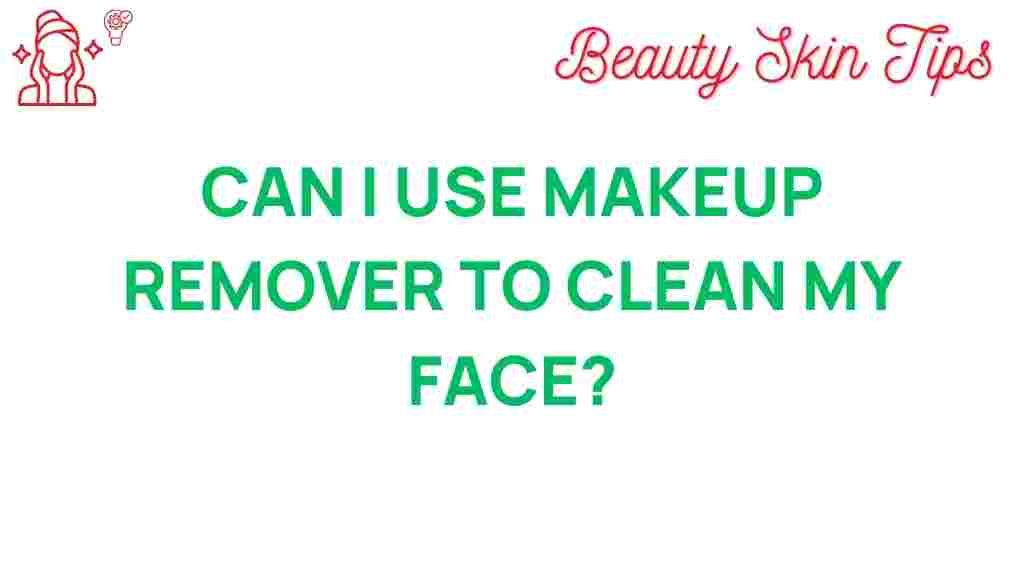The Surprising Truth: Can Makeup Remover Really Cleanse Your Face?
As beauty enthusiasts, we often find ourselves surrounded by an array of skincare products, each promising to deliver flawless skin. Among these products, makeup removers hold a special place, often touted as the first step in our cleansing routine. But can makeup remover really cleanse your face, or is it merely a tool for wiping away the day? In this article, we’ll explore the effectiveness of makeup removers, the best practices for using them, and how they fit into your overall skincare regimen.
Understanding Makeup Remover
Makeup remover is specifically formulated to dissolve and remove makeup from the skin. It comes in various forms, including:
- Liquid cleansers
- Creams
- Wipes
- Balms
- Oils
Each type has its own unique properties and benefits, making it essential to choose the one that suits your skin type and makeup preferences.
How Does Makeup Remover Work?
The effectiveness of makeup remover lies in its formulation. Most makeup removers contain surfactants that break down the bonds between the skin and the makeup, allowing for easy removal. Here’s how they work:
- Dissolving Makeup: The active ingredients in makeup removers penetrate the makeup, effectively dissolving it.
- Wiping Away Residue: Once the makeup is dissolved, it can be easily wiped away with a cotton pad or cloth.
- Preparing Skin for Cleansing: After removal, your skin is primed for the next step in your skincare routine, whether that be a cleanser or a toner.
Step-by-Step Guide to Using Makeup Remover
To maximize the benefits of your makeup remover, follow these simple steps:
- Choose the Right Product: Select a makeup remover that suits your skin type. For oily skin, oil-free removers are ideal, while dry skin may benefit from cream-based options.
- Apply the Product: Using a cotton pad or your fingertips, apply the makeup remover directly onto the areas with makeup.
- Let It Sit: Allow the product to sit for a few seconds to effectively dissolve the makeup.
- Wipe Away: Gently wipe away the makeup in a downward motion, avoiding excessive rubbing.
- Rinse (If Needed): Some makeup removers require rinsing after use. Check the instructions on your product.
- Follow Up with Cleanser: To ensure your skin is thoroughly cleansed, follow up with a gentle facial cleanser.
Can Makeup Remover Replace Your Cleanser?
This is a common question among skincare aficionados. While makeup removers are excellent for removing makeup, they are not designed to cleanse the skin thoroughly. Here’s why:
- Makeup Removers: Primarily target makeup and surface impurities.
- Cleansers: Formulated to remove dirt, oil, and bacteria that can clog pores and lead to breakouts.
For optimal skin health, it’s best to use a makeup remover as the first step in your cleansing routine, followed by a dedicated cleanser.
Types of Makeup Removers
Understanding the different types of makeup removers can help you choose the right one for your skin:
- Oil-Based Makeup Removers: Great for removing waterproof makeup, oil-based removers provide an effective cleanse without stripping the skin of moisture.
- Water-Based Makeup Removers: These are lighter and ideal for daily use, especially for those with normal to oily skin.
- Micellar Water: A gentle option that attracts dirt and oil, making it great for sensitive skin.
- Makeup Remover Wipes: Convenient and portable, wipes are perfect for travel but may not be as effective for heavy makeup.
Tips for Choosing the Right Makeup Remover
When selecting a makeup remover, consider the following tips:
- Identify your skin type (oily, dry, combination, sensitive).
- Read reviews and look for products with natural ingredients.
- Avoid alcohol-based removers as they can be harsh on the skin.
- Test the product on a small patch of skin to ensure no irritation occurs.
Troubleshooting Makeup Remover Issues
If you find that your makeup remover isn’t working as effectively as you’d hoped, consider these troubleshooting tips:
- Still Have Residue? Ensure you are using enough product and allowing it to sit for a few seconds before wiping.
- Skin Irritation: Switch to a gentler formula or opt for a hypoallergenic brand.
- Breakouts: If you experience breakouts, consider using a non-comedogenic makeup remover.
The Benefits of Using Makeup Remover
Incorporating a makeup remover into your skincare routine offers several advantages:
- Effective Makeup Removal: Removes even the most stubborn makeup products.
- Prepares Skin: Prepares your skin for cleansing, ensuring a deeper clean.
- Prevents Breakouts: Helps remove impurities that can contribute to acne.
Conclusion
So, can makeup remover really cleanse your face? The answer is yes, but with some caveats. While makeup removers are effective at dissolving makeup and preparing the skin for further cleansing, they should not replace your regular facial cleanser. For the best results and optimal skin health, use makeup remover as the first step in your skincare routine, followed by a suitable cleanser.
By understanding the different types of makeup removers and how to use them effectively, you can enhance your skincare regimen and enjoy healthy, radiant skin. If you’re looking for more skincare tips, check out this comprehensive guide on skincare routines.
Remember, the key to beautiful skin is not just in the products you use but also in how you use them. Choose wisely, and your skin will thank you!
This article is in the category Skincare and created by BeautySkinTips Team
